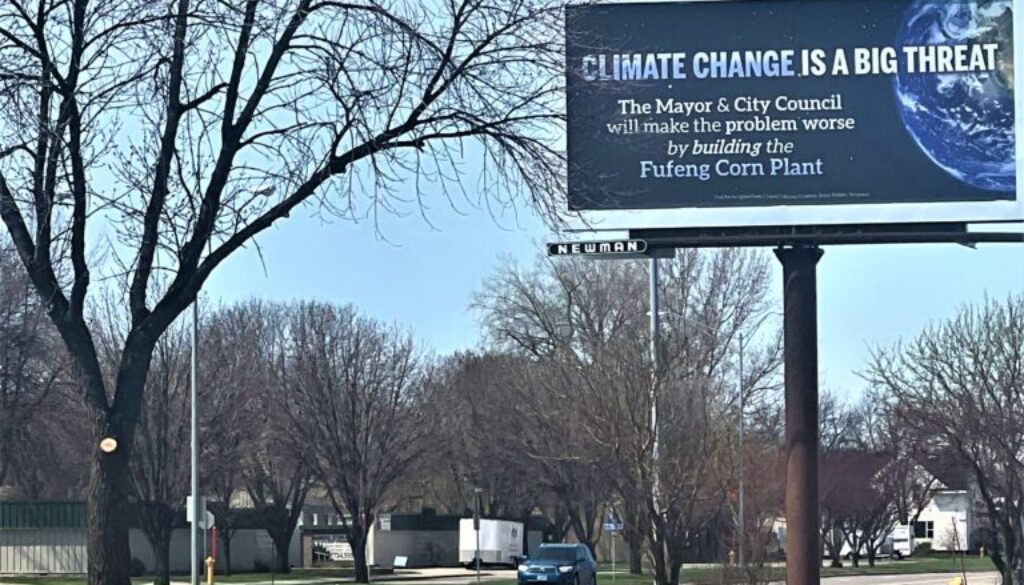Plans for a Chinese corn mill in North Dakota spur uproar
By Caitlin Looby
Until retiring last year, Frank Matejcek spent most of his life farming: raising cattle, growing wheat, sugar beets and other crops on 800 acres just outside Grand Forks, North Dakota, on the border of Minnesota.
Now, after 50 years of working the land, Matejcek and his wife Lucy are among a number of farmers and other Grand Forks-area residents who say they are fighting to protect the land, and their community, from plans for the construction of a large wet corn mill plant by the Chinese conglomerate Fufeng Group Ltd.
The plant would be the first U.S.-based manufacturing facility for Fufeng, a Hong Kong-based holding company engaged in a range of agricultural, chemical and other businesses. The project is slated to be constructed on a 370-acre site, using corn to make food additives, animal feed and other products.
State and city leaders have cheered the plans, and say the project will bring a much-needed boost to the workforce and economy.
But opponents, including Matejcek, whose farm is less than two miles from the proposed plant site, say they have many concerns about the plant, including large tax breaks given to its Chinese ownership, and how the plant will impact the environment, including water demands and increased natural gas use.
“The pollution and the water usage and the land usage . . . the transportation issue, is going to be a nightmare,” Matejcek said.
Opponents also point out that the plant will be located close to the Grand Forks Air Force Base, a factor that many believe should trigger national security concerns. City officials say they consulted with the FBI and found no issues with national security.
Despite the assurances of city officials, roughly 5,000 residents signed a petition in March demanding that the project be placed on the ballot for a public vote.
But last month the city rejected the petition.
In response, on May 6, a group calling itself People for the Vote LLC filed a complaint with the Grand Forks County District Court alleging the rejection was not legally valid, and asking the court to compel the city to accept the petition and grant a vote.
Grand Forks continues to push the forward; a City Council meeting is set for May 16 to vote on matters that will further advance the project.
“What’s good for farmers”
Grand Forks City Administrator Todd Feland told The New Lede that Fufeng will be a boon to the area, adding jobs and an eager buyer for corn producers in the region.
“What’s good for farmers in Grand Forks is good for Grand Forks and our economy,” he said.
The wet corn mill is expected to take more than two years to build and will employ roughly 1,000 construction workers, according to Keith Lund, president and CEO of the Grand Forks Region Economic Development Corporation. Lund said there will be upwards of 1,000 construction workers on site. The plant itself should employ about 230 high-paying jobs, he said.
Opponents fear the environmental toll this will have on the city and its natural resources, and the fact that the city is planning to spend tens of millions of dollars in wastewater treatment upgrades to accommodate the new plant.
And the wet corn mill plant will add about 1,000 more trucks to the area each week, as well as more trains, which will add to noise and air pollution in the area, the critics say.
“We’re at a time now where climate change is widely recognized as a serious problem,” said Dexter Perkins, a geology professor at the University of North Dakota who lives in Grand Forks.
“All the experts say we need to decrease carbon dioxide emissions, not increase them,” and the project will “double the amount of natural gas that’s being burned in our city,” Perkins said. “There’s no end to the list of concerns.”
Water concerns
The project is also expected to double the amount of water taken from local rivers. Today, the city uses about 7.6 million gallons per day, while the Fufeng project will use 6.6 million gallons per day.
Last summer, severe drought conditions affected much of North Dakota, with Grand Forks citizens told to limit their water use because of the shortage.
“The more and more I have learned and read about this corn-mill plant, the more concerns I have,” said local resident Michelle Spicer, whose family runs a business near Fufeng’s proposed mill site. “I believe our city council has rushed into this project and has not given it the prudence it deserves. ”
Lund said concerns about the Fufeng project are overblown and there is plenty of water to go around, as the city of Grand Forks lies at the confluence of the Red River and Red Lake River.
Yet the health of the Red River is already in decline, according to a report released by Minnesota in 2018. The Red River runs north, ending in Lake Winnipeg in Canada, and many reaches of the river fail Minnesota’s standards that determine whether the water can support healthy aquatic life and consumption.
Senta Grzadzielewski, whose husband Ben walked hours through cold and snowy March weather to collect petition signatures, said the city’s assurances about the water supply are “short sighted” considering “we will see more and more droughts happening with climate change.”
“We don’t like the approach to silence the voice of the people,” Grzadzielewski said. She and her husband, along with a few other families, spearheaded the petition effort. She is also one of the administrators for the Facebook page “Concerned Citizens of the Fufeng Project,” which currently has 1,700 members.
“I personally felt like if we didn’t take action at all, we were allowing precedents to be set,” she said.
Opponents are also upset that company will get a 20-year tax break. For the first ten years, the Fufeng Group will get a 90 percent tax exemption, and then 75 percent for the following ten years.
But according to Feland, even with the tax breaks, the project will still bring in a lot of money to help the city pay for schools, park districts, county and city. He estimates that at a 10 percent taxation rate, there will still be upwards of a million dollars coming into the city each year.
He also believes that the wet corn mill plant will attract ancillary businesses that will come in and use byproducts, citing the Cargill corn mills in Fort Dodge, Iowa, and Blair, Nebraska as examples.
City officials say they will work with Fufeng to address concerns pertaining to water, wastewater, transportation, traffic, and other issues.
“The pressure is on us to deliver,” said Feland.
Response from Fufeng USA (added May 24, 2022)
We hear the concerned citizens and want to assure you we have solutions to those concerns in place. Leading environmental protection technology will mitigate odor and air pollution. Fufeng USA will adhere to the North Dakota Department of Environmental Quality Regulations and Clean Air Act. We are working closely with the city of Grand Forks consultants to meet the community’s expectations. All federal EPA standards will be followed.
There will be plenty of water to serve Fufeng USA and all other city needs. Grand Forks is permitted for up to 39.4 million gallons per day (MGD). The city currently averages about 7.6 MGD and the plant will use about 6.6 MGD, equaling 14.2 MGD. The Red River and the Red Lake River merge at Grand Forks and the overall combined flow averages 104.9 MGD.
Fufeng USA is working with city officials on both odor and traffic studies and has been a participant in many conversations about ensuring the plant is a positive addition to Grand Forks and the surrounding region.
The project will utilize the PILOT (payment in lieu of taxes) program. This economic development incentive means the city will defer a portion of near-term taxes and Fufeng USA will make a significantly larger payment that is much greater than what the land would generate if left undeveloped both in the short and long-term. By attracting businesses like Fufeng USA, the city assumes a larger and more diverse tax base. This means the cost of operating expenses are spread across more paying entities, which reduces the tax burden on residents as businesses and industry contribute more.
The city of Grand Forks has gone above and beyond the normal due diligence to ensure this plant will be beneficial to the region. The FBI and Grand Forks Air Force Base have both discussed the plant with city officials and no red flags or concerns have been raised. The North Dakota Trade Office has searched for illegal import or export activity for Fufeng USA and its principals. No red flags or areas of concern were found. We are led by an American leadership team and will operate under all U.S. laws, regulations and oversight.
Finally, Fufeng USA will create a local market for a fourth value crop in the Grand Forks region. In addition to grain, potato and soybean crops, farmers will see more competitive corn prices. We are excited to call this community home and look forward to the great things to come.
 EWG
EWG



May 17, 2022 @ 12:33 am
If this plant truly is a good idea, why not round up some American investors and do something home grown? This would keep more of the wealth created in this economy, where they are much needed.